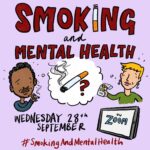A drug is a chemical substance that acts on the brain and nervous system, changing a person’s mood, emotion or state of consciousness. Drugs are often classified by the effect they have.
Stimulants, such as cocaine, make people feel full of energy. Depressants (or sedatives), such as heroin, make people feel relaxed. Hallucinogens, such as LSD, make people see, feel or hear things that are not real. Drug or substance misuse is when a person regularly takes one or more drugs to change their mood, emotion or state of consciousness.
Cannabis use in college: genetic predispositions less influential than social environment

Sally Turner reviews a recent study exploring cannabis use in college, which provides useful evidence relating to how universities could promote a sense of community, belonging and support to students who use cannabis.
[read the full story...]








